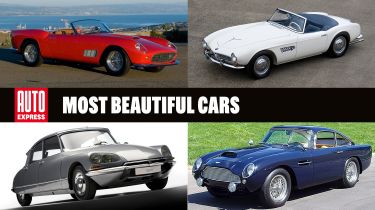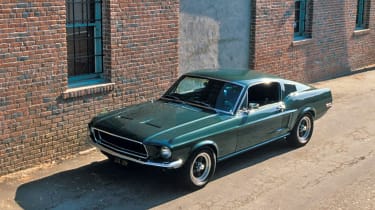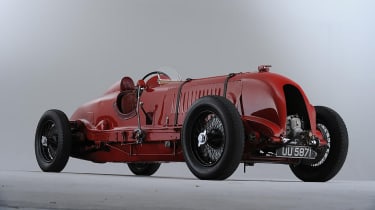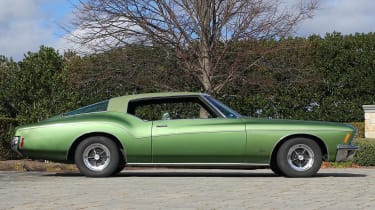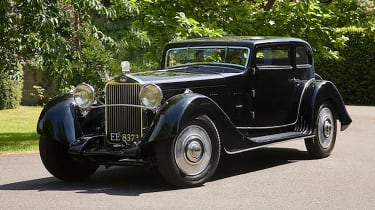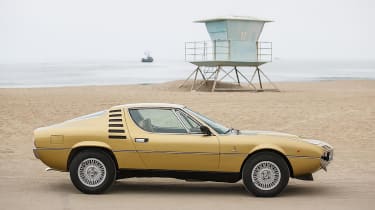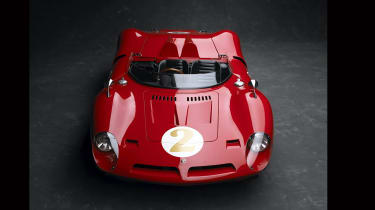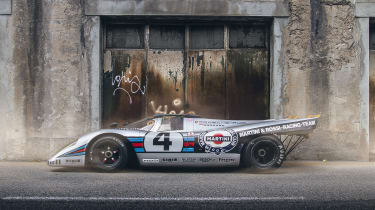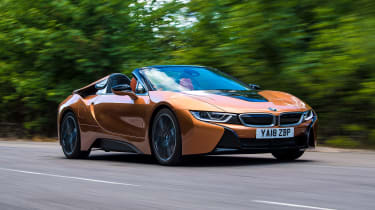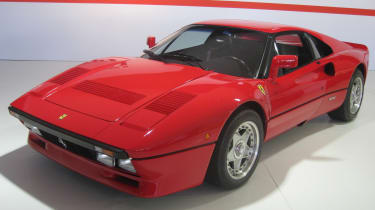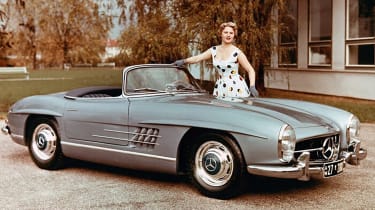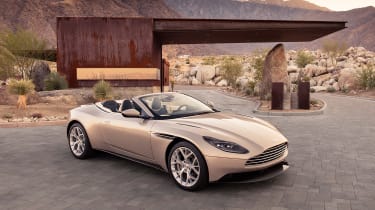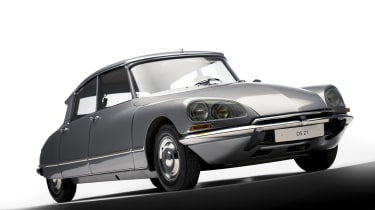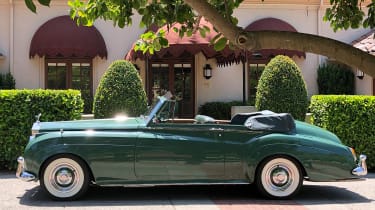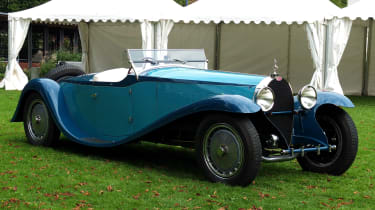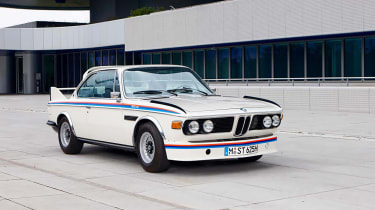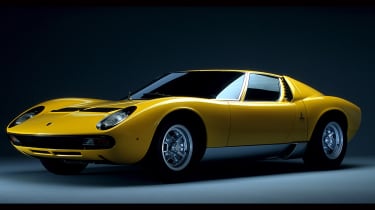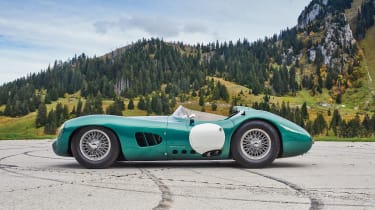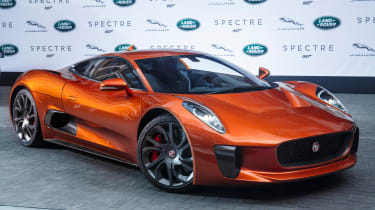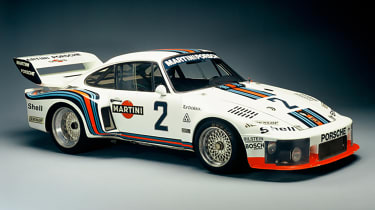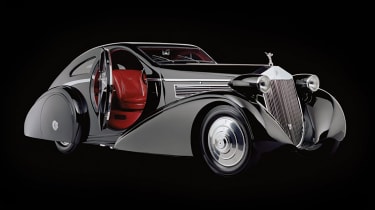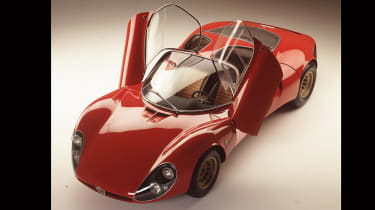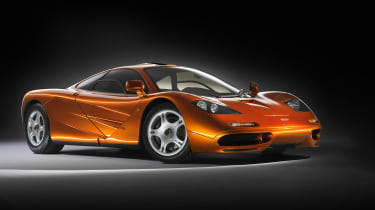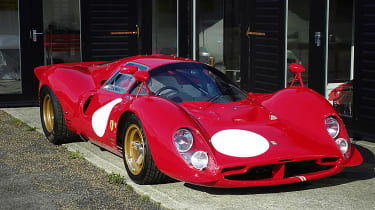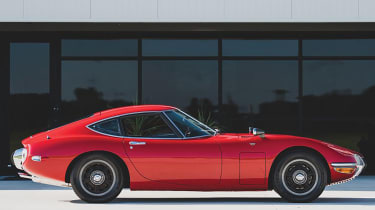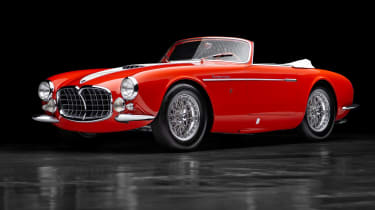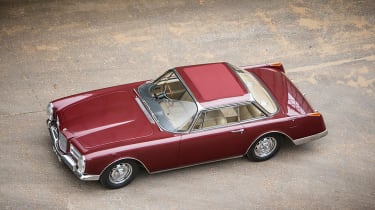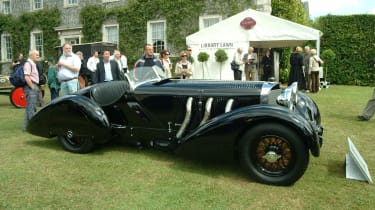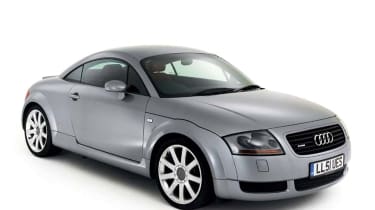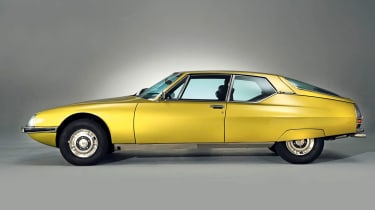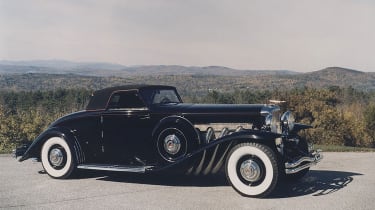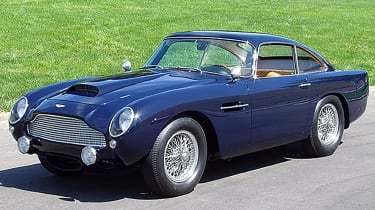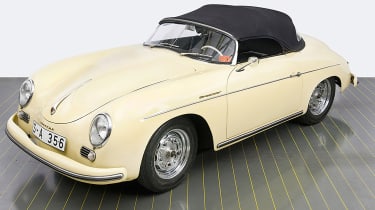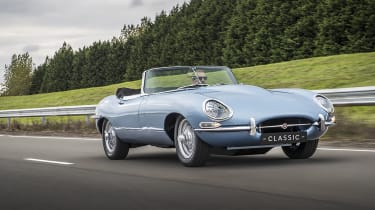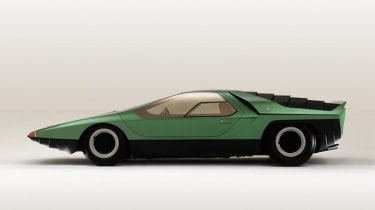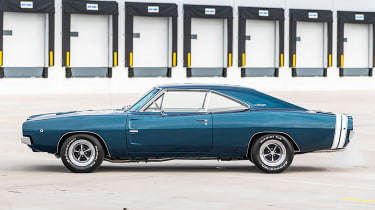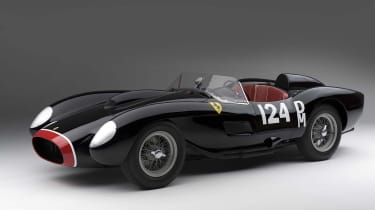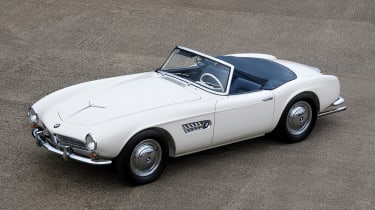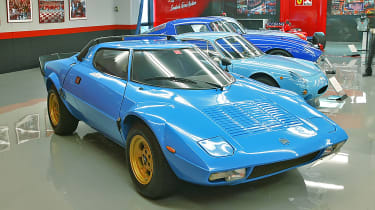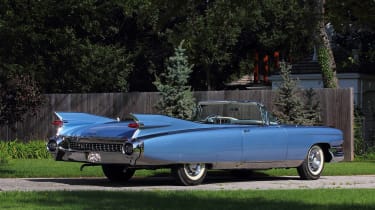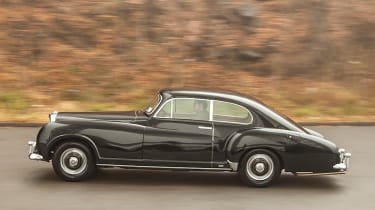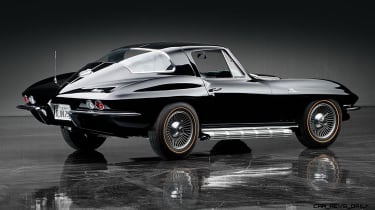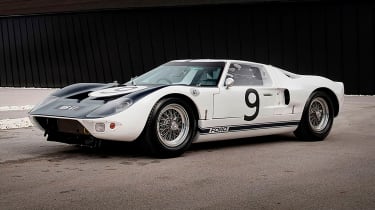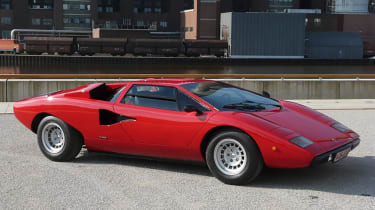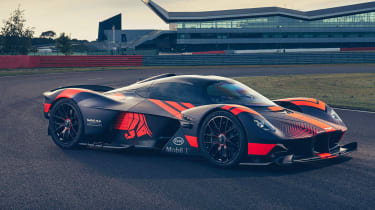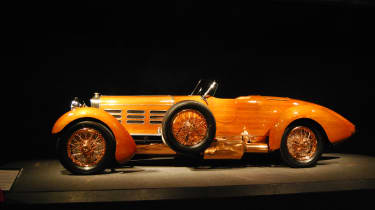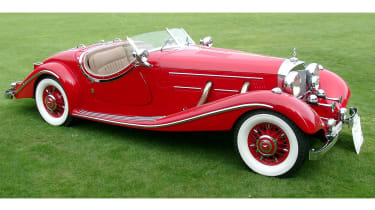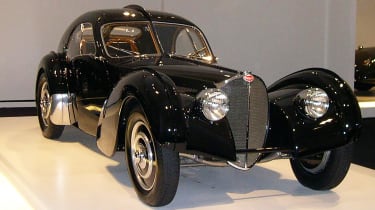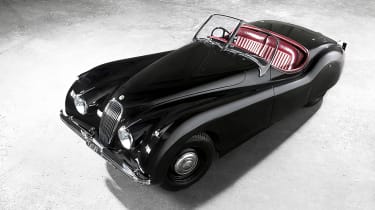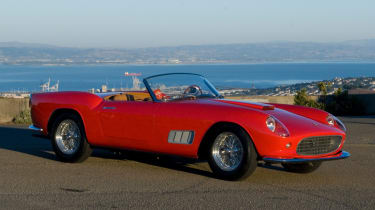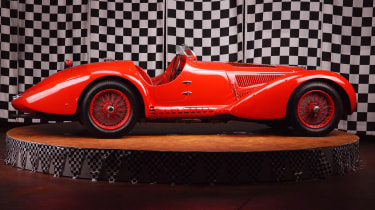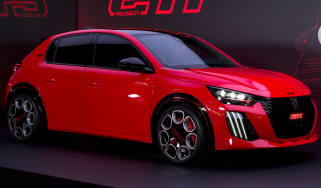The world's most beautiful cars
What is the most beautiful car in the world? These are our top 50 automotive stunners
Beauty, as they say, is in the eye of the beholder. Thankfully, though, when it comes to deciding the world’s most beautiful cars, there’s a strong consensus among car and design fans (at least for the most part).
We’ve been fortunate enough to behold the very finest automotive eye candy in person over the years, and after plenty of debate, we’ve assembled our verdict on the world’s most beautiful cars right here.
Some of these beautiful cars managed to rewrite the design rule book when they made their respective debuts, and to this day manage to make hardened petrolheads weak at the knees. Other models, meanwhile, take a different yet equally effective approach to beauty. They simply follow the established design trends of the day but wear them just that bit better than the rest of the crowd.
With such timeless and appealing designs, these machines have inevitably become some of the most sought after and expensive models of their eras as collectors scramble to own these rare pieces of automotive art.
The 50 most beautiful cars in the world
50. Ford Mustang fastback
- Years produced: 1964 to 1973
The Plymouth Barracuda might have beaten the Ford Mustang into showrooms by a couple of weeks in 1964, but it was the fabulous sporty style of the Ford fastback that really kicked-off the ‘pony car’ revolution. In fact the Mustang became almost ubiquitous among style, performance and budget-conscious drivers in the US, selling one million copies within two years of launch.
There are many Mustang ‘hero’ cars, including Mach 1 and Shelby versions, not to mention the famous Bullit 390 GT model driven by Steve McQueen on screen. Whichever way you look at it, the muscular fastback Mustang is a legendary design, which has influenced rival coupes from manufacturers all over the world.
49. Birkin Blower Bentley
- Years produced: 1927 to 1931
Bentley Blower No 1 was a supercharged racing car developed privately by Sir Tim Birkin with the assistance of engineering wizard Amherst Villiers, because W.O. Bentley wouldn’t countenance the supercharging of his 4.5-litre four-cylinder model.
However once Birkin had proved the viability of the ‘Blower Bentley’ concept, W.O. was persuaded to build 50 factory cars in order to qualify the design for racing at Le Mans.
Birkin’s original prototype was a single-seat race spec car suitable for competition at the Brooklands Circuit, where it set the lap record of 137.96mph.
In 2012 Bonhams sold the original Blower Bentley for more than £5m, and Birkin’s legacy received a recent boost when Bentley declared its intention to build a series of ‘continuation’ Blower Bentley tourers.
48. Buick Riviera (Mk3)
- Years produced: 1971 to 1973
The Buick Riviera was a GM luxury model introduced in 1963, but it wasn’t until the third generation Riviera arrived in 1971 that it flaunted the extravagant ‘boat tail’ rear end for which the model is now famed.
The car was designed by Jerry Hirshberg working under GM’s styling wizard Bill Mitchell, and the large wraparound rear screen was inspired by a similar treatment applied to the Corvette Stingray. In spite of appearances, the glass is formed of two pieces which butt closely together at the centreline.
Hirshberg had previously worked on a couple of other GM icons, namely the ‘67 Firebird and ‘68 GTO for Pontiac. He moved to Nissan’s California design centre in 1980, where he was responsible for somewhat less radical designs such as the Nissan Altima and Sentra.
47. Delage D8
- Years produced: 1930 to 1940
This company was founded in 1905 by Frenchman Louis Delage and the cars that bore the Delage name were renowned for both their racing successes and their luxury. During the 1920s and 30s the firm competed for luxury sales with Hispano-Suiza and in1930 the flagship D8 model was introduced.
Named for its new in-line eight-cylinder engine which was a first for a French manufacturer, the Delage D8 was supplied in chassis form to be fitted out with a range of typically opulent bodies by some of the leading lights of the Paris coachbuilding scene, including Chapron, and Letourneur et Marchand which built the stunning 1933 coupe pictured here.
There’s little superfluous ornamentation apart from the Lalique crystal mascot on the prow, but the proportions are everything for this beautiful survivor.
46. Alfa Romeo Montreal
- Years produced: 1970 to 1977
Bertone’s designer Marcello Gandini was still revelling in the success of his Lamborghini Miura design when he produced the concept version of this stunning Alfa Romeo coupe in 1967.
The car was revealed at Expo 67 in Montreal, and the production version took the city’s name when it went on sale after the Geneva Motor Show in 1970.
Power came from a 2.6-litre V8 developed from the two-litre V8 in the T33 Stradale supercar, and the Montreal used the chassis and running gear from the popular Alfa Giulia GTV coupe.
Priced considerably higher than a Porsche 911 or Jaguar E-Type, the Montreal was unable to match the sales success of either, and fewer than 4,000 cars were produced. Its chances were arguably limited by Alfa’s failure to homologate a version for the North American market.
45. Bizzarrini P538
- Years produced: 1965 to 1969
This gorgeous little projectile is a racing car from the stable of Scuderia Bizzarrini, and it was built and raced with both V8 and V12 engines - the former lifted from the Chevrolet Corvette, and the latter from Lamborghini.
The mid-engined P538 may have looked spectacular, but its potential was never fully tapped. The V8 powered version completed three-hours of the 1966 Le Mans 24hrs race, while a V12 version planned for a subsequent Le Mans campaign was not completed when Scuderia Bizzarrini collapsed into bankruptcy.
The story didn’t end there however, as the beautiful Bizzarrini P538 re-emerged as a ‘continuation model’ built by Salvatore Diomante using the original body moulds. It’s thought only around a dozen of either version exist today.
44. Porsche 917
- Years produced: 1969 to 1971
The Porsche legend was built almost entirely from its successes in sports car racing, and even within the German firm’s illustrious racing car portfolio, the Porsche 917 stands out as a truly iconic machine.
Introduced in 1969, the 917 won the Le Mans 24hrs in 1970 and 1971, but only after teething troubles with the aerodynamics were ironed out. It was powered by a flat-twelve engine developed from two Porsche six-cylinder engines, and innovations included a tubular chassis filled with pressurised gas. If the chassis fractured a gauge showed the driver a pressure loss, and his race would be over.
As beautiful to watch as they were successful, three of the 59 917s that Porsche produced are known to have been converted for road use - including the Martini-liveried car pictured.
43. BMW i8
- Years produced: 2014 to 2020
The alternative-drivetrain and hybrid-powered cars that reached production were largely dull but worthy machines until the BMW i8 arrived on the scene in 2014. Following-on from the 2009 BMW EfficientDynamics concept car, the i8 featured styling that was futuristic with a bit of a sci-fi feel, which suited the car’s technology story, but there are also strong hints of BMW’s earlier mid-engined supercar the M1 from 1978.
The roadster version arrived in 2018, more than five years after it was previewed in the form of the i8 Spyder concept at the 2012 Beijing Auto Show. It was worth the wait though, as the two-seat open car looks even more glamorous with buttress-like headrest fairings and exotic butterfly doors. Who said the future of motoring had to be boring?
42. Ferrari 288 GTO
- Years produced: 1984 to 1986
The Ferrari 308 was an already beautiful sports car styled by Pininfarina to replace the Dino in 1975, but the shape arguably never reached its full potential until it evolved into the 288 GTO in 1984.
The 288 GTO was a ‘halo car’ designed as a response to the inroads made by rivals like the Porsche 911 Turbo into Ferrari’s road car sales, and featured a new twin-turbo 2.9-litre V8 making close to 400bhp. With the engine mounted longitudinally instead of transversely across the engine bay, the 308 body had to be lengthened while wider tyres meant the arches were fattened-up too.
Aggressive spoilers were also part of the redesign package, along with the 288 GTO’s trademark wing-mirrors, raised up like little flagpoles to give vision over the enlarged haunches.
41. Mercedes-Benz 300 SL
- Years produced: 1954 to 1963
Arguably the Mercedes brand’s most iconic model yet, the 300SL famously arrived sporting incredible ‘gullwing’ doors in 1954. A road-going spin-off of the firm’s 1952 W194 Le Mans-winning racer, the 300SL was not only jaw-droppingly beautiful, but was also the world’s fastest production car with a 160mph+ top speed.
Power for the partially aluminium-bodied machine came from a six-cylinder three-litre engine, and the gullwing doors were necessitated by the design of the chassis with its high sills, which meant standard doors couldn’t be fitted.
The factory had never intended to make a road car out of the W194, but US importer Max Hoffman saw the potential and ordered 1,000 cars on-spec, spurring the factory into action.
A roadster version of the SL was introduced in 1957, which replaced the gullwing coupe altogether - a reflection of the tastes of buyers in California, the 300SL’s key market.
40. Aston Martin DB11
- Years produced: 2016 to 2023
The Aston Martin DB11 arrived in 2016 when it replaced the much loved and admired but long-serving DB9. It was a tough warm-up act to follow, but this luxurious GT pulled the trick off with aplomb.
The exterior design is credited to Miles Nurnberger under the leadership of Marek Reichmann, and while the front end is an unmistakable evolution of the familiar Aston face, the tautly drawn body panels give the DB11 a distinctive athleticism the DB9 can only dream of. Roof strakes and a tautly-tapered rear complete the image, but the DB11 looks ever more stunning in Volante convertible trim.
39. Citroen DS
- Years produced: 1955 to 1975
Citroen’s Traction Avant, on sale since 1934, had become such a familiar part of French motoring life that the debut of the radical DS at the 1955 Paris Motor Show blew assembled minds. Citroen took 743 orders in 15 minutes at the show, and 12,000 on the first day.
DS in French sounds like ‘Déesse’ or ‘Goddess’, and the spec of the new Citroen was suitably out of this world. For a start the beautifully sculptural styling was like nothing seen before or since, while the DS also featured an incredible hydropneumatic ride, variable assistance power steering and a hydraulic automatic clutch. The DS was also the first mass production car in history to feature disc brakes.
Another little-known DS fact is that up until 1966 Citroen assembled UK versions at a factory in Slough. Such was the popularity of the space-age Citroen that it remained on sale for twenty years - almost as long as the Traction Avant.
38. Rolls-Royce Silver Cloud Drophead Coupe
- Years produced: 1955 to 1966
Rolls-Royce is a marque dripping with glamour, and one that has always been associated with celebrity. That association never looked so stunning as the Rolls-Royce Silver Cloud Convertible and Hollywood megastar Elizabeth Taylor, who reportedly chose it in Smoke Green as it matched the colour of her wedding dress.
Taylor kept her Silver Cloud for twenty years, and her beloved motorcar was a 1961 Series II model with V8 power. The six-cylinder Silver Cloud I appeared in 1957, and production ended in 1966 with the last of the Series III cars - recognisable by their quad-headlamps. The Silver Cloud was produced primarily as an opulent and beautiful four-door saloon, but the drophead and coupe bodies were also popular, and generally considered to be even better looking.
37. Bugatti Royale Esders Roadster
- Year produced: 1932
Big is beautiful, some say, and cars don’t get much bigger than the Bugatti Type 41 Royale. At 6.4m long and weighing comfortably more than three tons it is one of the largest cars ever produced.
Only half a dozen Royales were built, but one of the most striking was the Royale Esders Roadster made for French clothing tycoon Armand Esders. The Esders Roadster featured a magnificent two-seater body with extra occasional seats folding out from the boot - a so-called ‘dickey seat’. Driving a two-seater the same length as the current stretched Mercedes-Maybach S600 limousine obviously seemed a little extravagant for the next owner, who modified the Esder Royale with a more practical Coupe de Ville body.
However we can still enjoy the looks of the original, as the car-mad Austrian Schlumpf brothers commissioned a replica for their famed collection. It had no headlights, as Esders reckoned they spoiled the looks and he had “no intention for driving after dusk”.
36. BMW 2800 CS
- Years produced: 1968 to 1975
One of the prettiest mainstream coupes of the late-sixties and seventies, the six-cylinder BMW 2800 CS had the looks of a thoroughbred. Based on the same platform as the four-cylinder 2000 coupe that preceded it, the new car featured a lengthened bonnet to accommodate the longer engine, while the new tapered nose treatment with twin circular headlamps transformed the 2000’s somewhat gawky styling.
CS performance was upgraded in 1971 when three-litre models arrived, with twin carburettors on the 3.0 CS or fuel injection on the more powerful 3.0 CSi which boasted almost 200bhp. Enthusiasts are especially fired-up by the 3.0 CSL ‘homologation special’ that used thinner steel and aluminium panels to reduce weight for racing. The CSLs cleaned up on the racetrack, winning six European Touring Car Championships in the 1970s.
35. Lamborghini Miura
- Years produced: 1966 to 1973
Another masterpiece from the drawing board of Bertone’s Marcello Gandini, the Lamborghini Miura is not only remarkable as the first mid-engined production supercar, but also because in spite of half a century of newer competition, it’s also still regarded as one of the most beautiful.
The swoopy V12-powered design was completed in such a rush for the 1966 Geneva Motor Show that engineers didn’t even know if their engine fitted. So the Miura made its debut with ballast in the engine bay and its cover firmly locked.
Production of the Muira started the following year, with the 3.9-litre V12 very much part of a package. Superstardom followed, spurred on by an appearance in the 1969 movie The Italian Job, when a Miura was shown being destroyed by a mechanical earthmover.
34. Aston Martin DBR1
- Years produced: 1956 to 1959
There’s a saying that if it looks right, it is right, and few would argue that Aston Martin’s 1956 sports racing car looked the absolute business. The proof of the saying came in 1957 when the gorgeous DBR1 won the Spa Sportscar Race and the Nurburgring 1,000km race. Overall victory followed at the Le Mans 24hr race in 1959, with Carroll Shelby and Roy Salvadori at the wheel and a second DBR1 close behind - 25 laps ahead of the nearest competitor.
The DBR1 wrapped up its best year with Aston’s only World Sports Car Championship win, thanks to an incident-packed race at the Goodwood Tourist Trophy with Stirling Moss taking the chequered flag. In 2017 one of the five DBR1s built by the factory was sold at auction by RM Sothebys for an incredible $22.5m, a world record for a British car.
33. Jaguar C-X75
- Years produced: 2010 to 2013
One of the most beautiful recent Jaguars was a hybrid-electric supercar that was to be developed in partnership with the Williams F1 team, and go on sale in limited numbers in 2013.
The design was to follow the lines of the C-X75 concept revealed in 2010, but with a slightly less exotic powertrain. While the concept featured micro gas turbines to charge the hybrid battery and had an electric motor at each corner, the road-going versions were to get a BMW i8-style set-up with a turbocharged 1.6-litre petrol engine and twin electric motors giving a combined output of 890bhp.
Sadly, the global financial crisis kiboshed the project in 2012, but a C-X75 lookalike did appear in the 2015 Bond film Spectre - its body draped over a spaceframe racing car chassis with a dry-sump V8.
32. Porsche 935
- Years produced: 1976 to 1981
The 911 Turbo has dominated motorsport in a variety of classes over the years, but has it ever looked as good as in FIA Group 5 racing spec in the 1970s? Group 5 rules allowed significant modifications as long as the front-facing silhouette remained fixed, and Porsche went to town when creating the 935 racing machine - with incredible results. The whale-tailed, wide-arched 935 won more than 150 races, including taking all three slots on the podium at the Le Mans 24hrs in 1979, plus half a dozen wins at both the Daytona 24hrs and the 12hrs of Sebring.
Versions of the 935 were campaigned both by the Porsche factory and many privateer teams, and therefore in many racing liveries. The dark blue, light blue and red stripes of the Martini Racing sponsored 935s will be remembered best by many.
31. Rolls-Royce Phantom I Jonckheere Coupe
- Year produced: 1935
There’s a bit of a Marmite feel around the styling of the Rolls-Royce Phantom 1 Jonckheere Coupe, which means you’ll probably love it or hate it.
The car started life in 1925 as a Hooper-bodied cabriolet, but as was relatively common in its day, the car was rebodied in 1934 by Belgium coachbuilder Jonckheere. Less common was for a traditionally somewhat staid Rolls-Royce to be blessed with such a radical interpretation of fashionable art deco styling themes.
The fabulous Jonckheere coupe body is startling both for its sheer size at nearly 22ft nose-to-tail, and also for its sculptural aerodynamic lines and incredible circular doors giving access to the front and rear seats.
Sadly a fire at Jonckheere means we lost any record of who commissioned the Phantom’s new body, but it won the prestigious Cannes Concours d’Elegance in 1936. It now resides in the Petersen Museum in California.
30. Alfa Romeo T33 Stradale
- Years produced: 1967 to 1969
The Alfa Romeo Tipo 33 was a marginally successful but heart-stoppingly attractive racing car introduced in 1967. Those good looks came into their own when Alfa’s factory-backed racing team Autodelta decided to produce a road-going Stradale version, which became one of the world’s very first supercars.
Only 18 Stradales were built, five of which were unsold and ended up in the hands of Italian carrozzerias as the basis for concept cars such as Bertone’s Alfa Carabo. The Stradales themselves were the first production cars ever to feature butterfly doors, and used bespoke chassis that were 10cms longer than the racing car ones. Power came from the racer’s compact 2.0 V8 with almost 230bhp, enough for a sub 5-second 0-60mph time and a 160mph maximum - quite something in 1967.
29. McLaren F1
- Years produced: 1992 to 1998
Racing car designer Gordon Murray dreamt-up the idea of a no-holds-barred McLaren road car, and persuaded McLaren team owner Ron Dennis the project was a worthwhile diversion from F1 activities.
Notable for its three-seat cabin layout with central driving position, and thanks to exceptional light weight at less than 1,200kgs, even with a 600+ bhp V12 engine, the stunningly beautiful machine boggled the minds of seasoned reviewers. One illustrious car magazine even suggested it might be the fastest car the world would ever see - however the latest Porsche 911 Turbo is faster to 60mph, and modern hypercars would leave the F1 for dead.
There’s no denying the impact the McLaren F1 made in its day though, and a large part of its success is down to designer Peter Stevens who drew the F1’s iconic shape.
28. Ferrari 330 P4
- Year produced: 1967
Ferrari has produced a great many beautiful racing cars, but the 1967 330 P4 holds a special place in the hearts of fans of the marque. The P4 was the car that helped Ferrari avenge the insult of Ford’s stunning GT40 clean sweep at the first Daytona 24hrs in 1966, with a 1,2,3 Ferrari finish at the following 1967 race.
The Ferraris couldn’t loosen Ford’s grip on Le Mans, but they definitely looked fabulous while trying. The mid-engined sports prototype chassis with a V12 engine producing up to 450bhp was clothed in a swoopy body that still evokes a golden age of sportscar racing for many.
Just four P4 versions of the 330 were built, although only three were on new chassis as the first was a modified P3 - the previous year’s car. That one was burned out and written-off at Le Mans, but the other three factory P4s survive in private ownership - along with a handful of 412 Ps, which were the versions of the P4 built for customer racing teams. As you can imagine, values today run into tens of millions of pounds.
27. Toyota 2000GT
- Years produced: 1967 to 1970
Japan arrived relatively late to the automotive party, so while it has produced plenty of collectible and iconic models, it can’t be said to have a history of producing beautiful cars.
One obvious exception is the 2000GT, a fabulous sporting coupe designed to take on the best that Europe’s manufacturers could offer. It performed that task admirably, thanks to styling drawn in-house by Toyota designer Satoru Nozaki, and a two-litre straight-six engine from the Toyota Crown titivated by Yamaha with triple carbs and new cylinder heads to make 150bhp.
337 examples were produced and sold between 1967 and 1970, with sales limited by a price tag that comfortably exceeded rivals like the Porsche 911 and Jaguar E-Type. Two convertible models were built for the Bond movie You Only Live Twice.
26. Maserati A6G Frua Spyder
- Years produced: 1953 to 1955
Maserati produced around fifty of its A6GCS racing two-seaters from 1953-55, but it was Rome dealer Guglielmo Dei who spotted the opportunity to create a road-going version for his wealthy customers. Dei purchased half a dozen chassis which he sent to coachbuilders Pininfarina, Vignale and Frua - the latter creating a trio of gorgeous Spyders with their own design bodies.
The A6G Frua Spyders are widely considered to be some of the most beautiful Maserati road cars in the firm’s illustrious history, as demonstrated by the delightful restoration recently carried out to this example under the auspices of Kidston.
It’s the only surviving A6G Frua Spyder with matching numbers, which further increased its desirability, and Kidston recently sold the car for an undisclosed sum.
25. Facel Vega Facel II
- Years produced: 1961 to 1964
It was advertised as the fastest four-seater coupe in the world, thanks to a 135mph maximum speed claimed from a 6.3-litre Chrysler V8 engine, but the luxurious and expensive Facel II was most notable for the elegance of its aluminium coachwork.
The car wasn’t short of famous owners, with Pablo Picasso, Christian Dior, Tony Curtiss, Ava Gardner, Princess Grace of Monaco, Frank Sinatra, Ringo Starr, The Shah of Persia and Stirling Moss among the glittering celebrity names who succumbed to the short-lived marque’s undoubted charms.
Sadly, that wasn’t enough to keep the French manufacturer afloat, and Facel Vega folded in 1964 - after only 180 examples of the Facel II had been produced - due to an ill-fated venture into engine manufacturing.
The car pictured was bought by Ringo Starr in 1964 for £5,000, a price equivalent to that of a contemporary Rolls-Royce Silver Dawn.
24. Mercedes 710 SSK Trossi Roadster
- Year produced: 1930
The Mercedes SSK was one of the most glamorous cars of the late 1920s and ‘30s, not to mention one of the most highly rated sporting machines of its time. It was designed by Ferdinand Porsche as his last hurrah for Mercedes before leaving to set up on his own.
Most SSKs were bodied in-house with lightweight racing bodies, but this one purchased by Count Carlo Trossi - a future president of Scuderia Ferrari - was rebodied to what is believed to be his own design in 1930.
The car’s fabulous tear-drop styling cues were copied widely by European coachbuilders in the 1930s, and the trend-setting Trossi Roadster now resides in the Ralph Lauren collection. It was restored in the 1990s, after which it won several important international concours d’elegance competitions.
23. Audi TT (Mk1)
- Years produced: 1998 to 2006
The Audi TT began life at the VW Group’s California Design Centre in 1994, and it helped to reinvent Audi’s sporting image from the moment it was revealed as a concept at the Frankfurt Motor Show in 1995.
With inspiration from classic NSU and Auto Union racing cars from as far back as the 1930s, the TT managed to look both retro and futuristic all at once, and the clamour of approval from the media and public led to Audi launching a production model in 1998.
A mark of the design’s integrity was that the production car arrived looking remarkably similar to the concept, and that famous TT profile became instantly recognisable across successive generations of the car.
22. Citroen SM
- Years produced: 1970 to 1975
The Citroen SM was an imaginative attempt by the French firm to harness the high-performance potential of its ground-breaking chassis technologies, and its modernist styling was an accurate reflection of the model’s forward-looking character.
Features such as variable power-steering assistance, rain-sensitive wipers and even composite wheels were all on the SM spec list, but it’s surely the car’s styling that most endears it to a legion of fans.
Citroen’s head of design Robert Opron took credit for the SM, which has cues from the Citroen CX but in a teardrop form with an abruptly truncated Kamm-style rear end. Power came from a Maserati V6 - Citroen bought the Italian firm in 1968 - and the media raved about the SM’s effortless cruising ability. However contemporary customers seem to have been put-off by the car’s complicated technologies, and production ended abruptly in 1975.
21. Duesenberg Model J
- Years produced: 1928 to 1937
People don’t say ‘it’s a doozy’ much anymore but, when the phrase was coined as an expression of excellence, the Duesenberg Model J was the car it referenced.
The Model J was sold between 1928 and 1937 when the company folded, and was revered as one of the most powerful and luxurious cars in the world, with a level of technology and craftsmanship that rivalled the likes of Rolls-Royce and Hispano-Suiza.
Power came from a seven-litre straight eight engine, offered with 320bhp via supercharging from 1932 and a top speed of 140mph, but the impact and after-effects of the Great Depression constrained sales of this magnificent machine. Nonetheless, notable owners included Howard Hughes, Clark Gable, Greta Garbo and the Duke of Windsor, as well as Al Capone.
20. Aston Martin DB4 GT
- Years produced: 1959 to 1963
New for 1959, the sensational Aston Martin DB4 featured an aluminium fastback GT body designed by Italian masters Carrozzeria Touring. The car’s style met with much critical acclaim, while a 3.7-litre 240bhp straight six engine and disc-brakes all round meant performance was rewarding too.
A lightweight race-focused version of this fabulous machine was introduced later the same year, dubbed the DB4 GT. It had more power, with an engine upgraded to 302bhp, and a slightly shorter wheelbase to improve handling, while the body was made of thinner alloy to reduce weight.
75 examples were built, and as one of the most desirable Astons ever, it’s not surprising that the firm decided to build a series of 25 track-only ‘continuation cars’ for wealthy collectors in 2016. However the rarest and most expensive are the handful of original DB4 GT Zagatos, modified in Italy with a new grille and rounded-off rump.
19. Porsche 356 Speedster
- Years produced: 1954 to 1958
Porsche’s first production sports car was the 356, which was built from 1948 until the arrival of the 912/911 models in 1965. Originally developed as a coupe, the 356 was offered in Speedster guise from 1954 at the behest of US importer Max Hoffman. Porsche responded with the wonderful Speedster model, with its famously low raked windscreen and bucket-seat interior, and the model was an instant success,
Part of the 356 Speedster legend is the car’s association with 1950s movie hearthrob James Dean, but the little Porsche is undoubtedly photogenic in its own right. Various homages to the 356 Speedster include the very many replicas built over the years, as well as the highly collectible Speedster editions of the Porsche 911.
18. Jaguar E-Type
- Years produced: 1961 to 1975
Famously described by Enzo Ferrari as the most beautiful car ever made, the Jaguar E-Type was developed from the D-Type racing car that won three times at Le Mans.
Such was its success that the E-Type survived over three generations from 1961 to 1975, originally in 3.8-litre six-cylinder guise, then with a 4.2-litre six, and for the final Series 3 variant Jaguar’s 5.3-litre V12. Coupes and convertible versions were offered, but the most highly-prized cars these days are the early Series 1 models which are generally considered the prettiest thanks to their simpler, purer design.
Such is the enduring appeal of the E-Type’s design, that in 2020 Jaguar announced plans to revive the model with an all-electric drivetrain - the E-Type Concept Zero.
17. Alfa Romeo Carabo
- Year produced: 1968
It’s hard to imagine that Alfa Romeo struggled to sell its full complement of T33 Stradale supercars back in the 1960s, but were it not for that fact we’d never have been treated to the outrageously futuristic wedge-shaped Alfa Carabo concept.
Alfa handed over five of these now highly collectible machines to Italian coachbuilders, and Bertone revealed its stunning Carabo at the ‘68 Turin Motor Show. It was one of the very first wedge designs to see the light of day, and surely one of the prettiest. Thanks to its T33 underpinnings the Carabo was/is a fully working machine, but at only 39-inches high it’s not very practical. But who cares, just look at it!
16. Dodge Charger R/T (Mk2)
- Years produced: 1968 to 1970
With Dodge dealers clamouring for a sporty coupe rival to the Ford Mustang in 1965, company bosses didn’t want to muddy the waters for sister company Plymouth which already had the Mustang-fighting Barracuda. So instead they went for something the next size up - and the Dodge Charger was born.
Early models were successful, but a rebody in 1968 brought a new look with classic ‘coke bottle’ styling and a flying buttress rear windscreen. A moody full width grille with hidden headlights was carried over from the previous generation Charger. Best of all though, was a new Road/Track package featuring muscular 440 Magnum or 426 Hemi V8s and ‘bumble-bee’ stripes around its bootlid - pure muscle car pornography.
15. Ferrari 250 Testa Rossa
- Years produced: 1957 to 1962
It’s not surprising that some of the most collectible - read expensive - classic cars of all time are also the most beautiful. The racing Ferrari 250 Testa Rossa is one model that ticks both boxes, being extraordinarily rare and eye-wateringly pretty.
The aluminium bodied roadster was the follow-up to the successful 750 Monza, and featured Ferrari’s then state-of-the-art 3.0 V12 Colombo engine shoehorned under its tautly sculpted bonnet. In its hey-day the 250 TR won 10 World Sportscar Championship races including three Le Mans 24hrs and the Targa Florio.
Just 22 examples of the 250 TR were built, the early cars with bodies by Scaglietti featuring unmistakable ‘pontoon’ front wings either side of an F1-style nose. From 1959 Pininfarina revised the body for greater aerodynamics with a swoopy sportscar style front end.
14. BMW 507
- Years produced: 1956 to 1959
BMW has built many fine cars over the years, but arguably none as pretty as the 507 Roadster, a car so glamorous it attracted the attention of buyers including Elvis Presley, Fred Astaire, John Derek and King Constantine II of Greece.
In production from 1946 to 1960, only around 250 examples of the V8-powered 507 were sold, mainly because it ended up being far more expensive to build than BMW had planned. The roadster was conceived at the behest of the US importer who wanted a BMW to take on the Mercedes 300SL, but with a handbuilt aluminium body the 507’s selling price was double what the market would stand. In fact, the 507 nearly bankrupted BMW, offering industrialist Harald Quandt his chance to take control of the company - his children still own a majority stake.
13. Lancia Stratos HF Stradale
- Years produced: 1973 to 1975
One of the most iconic shapes on the 20th Century world rally stage was the fabulous Lancia Stratos, a car built to win the World Rally Championship which it promptly did in 1974, ‘75 and ‘76 with Sandro Munari at the wheel.
The Stratos was the result of a bold move by coachbuilder Bertone to pinch Lancia’s business from its traditional partner Pininfarina, and the wedge-shaped coupe with its iconic wraparound windscreen, penned by Bertone’s designer Marcello Gandini was both audacious and stunning. The Stratos was powered by a mid-mounted 2.4-litre Ferrari V6 engine designed originally for Ferrari’s own Dino, and nearly 500 road-going versions were built for homologation purposes. The survivors are highly collectible, and the Stratos has inspired many replicas too.
12. Cadillac Eldorado (Mk4)
- Years produced: 1959 to 1966
For lovers of finned Americana, things don’t get much better than the fourth-generation Cadillac Eldorado series introduced in 1959.
For starters, automotive fins don’t get much bigger, and in the case of the gigantic Eldorado land yacht, they served as the perfect mounting point for Cadillacs iconic rocket tail-lamps. A little excessive perhaps for some tastes, but the Eldorado fuelled the American dream for many, and sales of the 5.7-metre, 2.4-ton convertible proved the point.
Aside from its extravagant exuberances, the ‘59 Caddy marked a move to a wider, lower stance than its predecessors, inspired by the success of a similar design shift at Chrysler.
11. Bentley R-Type Continental
- Years produced: 1952 to 1955
Formerly the fastest four-seat passenger car in the world, and in its day probably the most expensive, the magnificent R-Type Continental set the standard for British car manufacturers in the early 1950s.
It was based on the R-Type ‘standard steel’ saloon chassis, but featured an upgraded 4.5-litre straight-six engine offering speeds of up to 120nph. The bodies were all coachbuilt, mostly by H.J. Mulliner, to a lightweight fastback designed influenced by the latest aerodynamic testing in the Rolls-Royce wind tunnel.
It’s a rare and beautiful machine, with just 208 chassis numbers recorded, and only a handful of R-Type Contis had bodywork from external suppliers. One such is the wonderful Franay bodied example pictured, recently sold at auction by Bonhams.
10. Corvette Stingray (C2)
- Years produced: 1963 to 1967
Sports car fans don’t tend to rate the handling of the Chevy Corvette compared to European rivals - it was named after a class of warship after all. From an aesthetic point of view though, the Corvette has always delivered, and perhaps never more so than in the guise of the iconic split-window coupe variant, aka the original Stingray.
1963 was the year Chevrolet introduced its MkII Corvette, and the coupe variant was the first of its kind, too. The styling was overseen by GM’s design guru Bill Mitchell, and while he considered the twin-pane rear screen essential, it was dropped a year later for a single rear window.
The ‘63 Stingray coupe has since become one of the most collectible Corvettes, and you’ve only to look at it to see why.
9. Ford GT40
- Years produced: 1964 to 1969
When Ford decided to take on Ferrari at Le Mans with a GT car, it turned to British racing car maker Lola for its chassis tech, added its own 289-cubic-inch/4.7-litre V8 engine, and draped it in a low-slung aluminium body with a roof height 40 inches above the ground - the maximum height allowed for international endurance racing.
That in a nutshell is how the now legendary GT40 arrived, and with the help of Carrol Shelby and a roster of star drivers, the name was etched into history by winning Le Mans four times in succession from 1966 to 1969.
It may be coincidental, but the GT40 also happens to look drop-dead gorgeous, which surely helps account for the multi-million pound price-tags achieved for cars like this early prototype GT40 sold in 2020 by Duncan Hamilton/Rofgo.
8. Lamborghini Countach (Mk1)
- Years produced: 1974 to 1990
Many enthusiasts prefer the original Countach LP400, which first introduced Italian coachbuilder Bertone’s startling and spectacular ‘wedge’ design to bedroom wall posters around the world. However, who could deny the visceral desirability of the LP400 S? This design put Bertone’s work on steroids with its fat wheel-arches covering the widest-available-anywhere Pirelli rear tyres, especially when buyers specified that mighty but optional ‘flying-vee’ rear wing.
Such was the impact of the wedge design with its rakish screen and trademark scissor doors, that the theme has been developed for Lamborghini’s top flight supercars all the way to the present day Aventador, not to mention recent one-off and limited edition models such as the Reventon, Veneno and Sian.
7. Aston Martin Valkyrie
- Years produced: 2021 to present
The recent trend for ultra-high-performance cars often results in exterior design that’s more focused on performance than aesthetics. The Aston Martin Valkyrie transcends the genre by managing to look beautiful while incorporating technology that wouldn’t be out of place on a futuristic jet fighter.
It’s a machine designed primarily to cleave the air in the manner of an F1 car, and which features an incredible cut-away ‘venturi effect’ underfloor to go with its mind-blowingly powerful circa 1,000bhp V12 engine, but the Valkyrie’s carefully-finessed curves are as drop-dead gorgeous as you’d expect from any modern Aston road car.
With production of the first road-going Valkyries slated for 2021, it will be fascinating to see how customers spec their cars.
6. Hispano H6B ‘Tulipwood’
- Year produced: 1924
The name Hispano-Suiza is revered amongst aficionados of luxury cars built between WWI and WWII, and its imposing H6 model was produced from 1919 right up to 1933. The company was renowned for its technically advanced approach, including lightweight aviation-inspired engines and power-assisted brakes - an industry first.
The H6B was the most powerful eight-litre variant, inspiring the build of five racing versions, one of which set international speed records including a 92mph average over 300 miles at Brooklands in 1924. The fabulous H6B Tulipwood was a racer entered in the 1924 Targa Florio, for which its driver Andre Dubonnet demanded a bodyweight of less than 45kgs. The result was this stunning wooden-strip torpedo roadster.
5. Mercedes-Benz 540K Spezial Roadster
- Years produced: 1936 to 1940
The Mercedes-Benz 540K was a stunning supercharged monster unleashed by the German firm in 1936, and while it was available in a variety of cabriolet, touring and limousine configurations, none were as glamorous and desirable as the Spezial Roadster version. This ultimate symbol of pre-war automotive decadence features a flowing long-tail two-seater body, and an inline eight-cylinder engine with a driver-operated supercharger for added performance.
At the time, while it was customary for many luxury cars to feature bodywork commissioned by owners from third-party coachbuilders, Mercedes at Sindelfingen employed a large team of in-house craftsmen to create bespoke commissions. Nowadays the 540K Spezial Roadster is one of the most prized and collectible models in the world.
4. Bugatti Type 57 Atlantic
- Years produced: 1936 to 1938
Art Deco lovers drool over the lines of this swoopily-fendered and finned coupe derivative of the Bugatti Type 57 touring model. Just four Atlantics were built in the late 1930s, following the reveal of Jean Bugatti’s similar Aerolithe show car at the Paris Salon in 1935.
The prototype was bodied in a magnesium alloy called Elektron, which was lightweight but flammable at high temperature so couldn’t be welded. Body panels were riveted instead, with the fasteners prominent on the car’s now iconic dorsal fin. The four Atlantic coupes produced in the likeness of the Aerolithe were bodied in aluminium, but retained the visible rivets.
3. Jaguar XK120
- Years produced: 1949 to 1954
Jaguar was on a roll in the late 1940s, on the brink of its first couple of Le Mans wins in the early ‘50s and eager to build on increasing post-war demand for indulgence and fun times. It responded at the 1948 London Motor Show with a swoopy two-seat roadster model intended originally as a showpiece for its new XK six-cylinder engine. The car met with such acclaim that it went into production immediately as the XK120 - named for the car’s top speed in MPH with the windscreen removed.
Available as a roadster, but also in fixed- and drop-head coupe guise, the XK120 evolved into XK140 and XK150 models, and was the precursor to the E-Type. The early XK120 roadsters are considered the most beautiful of the bunch by enthusiasts, who feel later cars with their beefier bumpers lost some of the original design ‘purity’.
2. Ferrari 250 GT California Spyder SWB
- Years produced: 1960 to 1963
Ferrari has a long back catalogue of impossibly glamorous cars, but the Ferrari 250 GT California Spyder is one of the most desirable of all time thanks to its beautiful open two-seater body created by the coachbuilding wizards at Scaglietti. In truth, any of the Ferrari 250 sports and racing cars deserve a place on this list, as the three-litre V12-powered series includes such luminaries as the 250 Testa Rossa and 250 GTO to name a few.
The California variant was designed for the US market as its name suggests, and a long-wheelbase version introduced in 1957 was superseded by the even-lovelier short-wheelbase in 1960 which benefited from disc brakes and an uprated 276bhp version of the V12.
1. Alfa 8C 2900 Mille Miglia
- Years produced: 1937 to 1939
There have been many beautiful Alfa Romeos over the years, but one of the highlights from a spectacular historic portfolio is the car that won the famous Mille Miglia Italian endurance race in 1938. The 8C 2900 was derived from Alfa’s 8C Grand Prix car, and featured an 8-cylinder inline 2.9-litre engine with twin superchargers.
The factory Alfa Corse racing team entered four in the 1938 Mille, including this one running the latest Tipo 308 295bhp Grand Prix engine, It was piloted by Clemente Biondetti to victory, with another 8C 2900 MM in second – the other two didn’t finish. The drop-dead gorgeous roadster bodywork of the MM racers was by Carrozzeria Touring Superleggera.
Buy a car with Auto Express. Our nationwide dealer network has some fantastic cars on offer right now with new, used and leasing deals to choose from...

